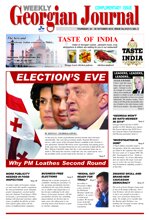Saakashvili’s arrest would thrust Georgia into Russia’s orbit – Financial Times
29 October, 2013
 Financial Times publishes an article about political developments in Georgia.
Financial Times publishes an article about political developments in Georgia.‘In the decade since the Rose revolution, Georgia has undergone a remarkable transformation from an almost failed state to a functioning, growing, fledgling democracy. Even after war with Russia in 2008, the tendencies of the Rose leader Mikheil Saakashvili’s government to try to monopolise power, and the peaceful transfer of power to a billionaire premier last year, that transformation is essentially intact.
But risks now loom, above all the potential arrest of Mr Saakashvili, now he is standing down as president. A dozen of his senior associates are facing corruption charges that they say are politically motivated.
Bidzina Ivanishvili, the mercurial premier, who is about to step down too only a year after his Georgian Dream coalition won parliamentary elections, is sending mixed messages. He is distancing himself from any potential criminal probe of the outgoing president and repeatedly saying an investigation is likely.
That appears either a signal that Mr Saakashvili’s fate – arrest, trial, imprisonment – is already decided, or an attempt to get him to leave the country. The president is considering spending a period in the US, say friends, but is reluctant to go.
Mr Saakashvili admits to political mistakes in office. But his arrest would be a blow not only for Georgia but also for democracy hopes across the former Soviet Union.
It would almost certainly halt Georgia’s plans to sign a far-ranging political and trade deal with the EU, vital to its continuing democratic development. Tbilisi hopes, like several ex-Soviet states, to initial such a deal – the final step before signing – at a summit next month.
Detaining the Rose leader would echo Ukraine’s jailing of Yulia Tymoshenko, co-leader of the 2004 Orange Revolution inspired by Georgia’s. After making Ms Tymoshenko’s release a condition of Ukraine getting an EU deal, European leaders could hardly treat Georgia differently, though Ukraine’s democratic backsliding since Viktor Yanukovich became president in 2010 has been far worse.
Without an EU agreement, Georgia might have little choice but to go further than Mr Ivanishvili has already in rebuilding ties with Russia. That might even mean joining the customs union Vladimir Putin, Russia’s president, has created with former Soviets Belarus and Kazakhstan, due to be deepened into a “Eurasian Union”.
After Ukraine’s reversals and turmoil in Egypt, Alexander Rondeli, a veteran foreign affairs analyst in Tbilisi, suggests the US desperately wants to avoid another setback for its democracy promotion efforts. “We’re the best hope left,” he says.
A presidential aide adds that Mr Saakashvili’s arrest would be a message to leaders across the ex-Soviet space: “Don’t hold free elections because you might go to jail.”
Yet take away the threat to the outgoing president and Georgian Dream’s year in office has brought some positives.
There is more political and media pluralism and debate in parliament. Mr Saakashvili’s United National Movement, despite the pressures on its leadership, has not been wiped out and is taking its place as a responsible opposition.
Growth has slowed from 6.1 per cent in 2012 to 1.9 per cent in the first half of this year, as anti-corruption probes halted investment projects. But business people say economic policy making has exceeded initial low expectations and growth should pick up.
Observers add that the legal system has become more independent, though the president’s supporters allege some courts are loyal to Georgian Dream and the government has shifted cases against allies of Mr Saakashvili to these courts.
Sunday’s presidential election, won convincingly by an ally of Mr Ivanishvili, the low-key Giorgi Margvelashvili, was Georgia’s calmest and freest yet.
On the negative side, Georgian Dream seems, like UNM before it, bent on dominating the political scene. There are concerns too that Mr Ivanishvili will still pull the strings from backstage.
Both Mr Margvelashvili and whoever is the next premier, now more powerful than the president after a change to the constitution, will owe their jobs to the billionaire.
Most worrying is a resurgence of nationalism and religious conservatism that has expressed itself in attacks on Muslims, ethnic minorities and gay people.
Mr Ivanishvili insists Georgia is on track to European-style democracy, but achieving it could take 20 years. It may be up to Georgia’s richest man to decide whether the power structures he has put in place will become an obstacle, or continue to lead the country along that path,’ article published by the Financial Times reads.





















































